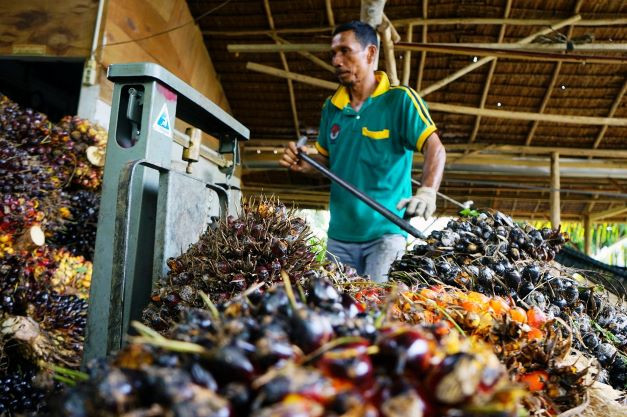Palm oil producers unconcerned as China, India move toward sustainability
Change Size

I
ndonesian palm oil producers are optimistic they can overcome the challenges presented by China and India’s transition toward sustainability, as experts stress the importance of having the country’s local sustainability standards recognized globally.
China and India are Indonesia’s main crude palm oil (CPO) export markets. China, through the 2020 Green Value Chain Policy Proposal and the 2022 Palm Oil Consumption Guidelines, and India, through the 2018 Sustainable Palm Oil Coalition for India (India-SPOC), are seeking to ensure that the palm oil they import adheres to higher sustainability standards.
Bukti Bagja, senior manager for smallholders and livelihood transformation at World Resources Institute (WRI) Indonesia, said the mostly early-stage policy proposals marked the beginning of a push for greener palm oil supply chains.
“These initiatives indicate that both markets are slowly trying to encourage sustainable practices in the palm oil sector,” he told The Jakarta Post.
Indonesian palm oil stakeholders, he said, could seize the opportunity to push for wider recognition of the Indonesia Sustainable Palm Oil (ISPO) certification, starting with China, considering Jakarta’s strong trade relations with Beijing.
The ISPO is a government-issued compliance certification that has largely failed to gain world market recognition.
“The government needs to convince global buyers that the ISPO is in line with global standards,” said Andrian Bagus Santoso, an industry and regional analyst at state-owned Bank Mandiri, on Thursday.
In the year to August, Indonesia exported 2.5 million tonnes of CPO to India and 1.6 million tonnes to China, accounting for 17 percent and 10.9 percent, respectively, of the country’s total CPO exports of 14.65 million tonnes, Statistics Indonesia (BPS) data show.
Indonesian Palm Oil Producers Association (Gapki) secretary general Eddy Martono suggested that stakeholders in the palm oil industry accelerate the oil palm replanting program to replace aging plants.
As oil palms age, they become less productive. Replanting increases productivity per hectare and relieves some pressure to exploit new land.
“Buyers are demanding sustainable products; Indonesia is prepared to [cater to that demand],” Eddy told the Post on Thursday.
Read also: Sustainable palm oil: Market leakage remains a challenge
Sustainability sidelined
Consumption of palm oil is increasing in parts of the world where the market for sustainable palm oil products is still in its infancy, NewForesight and the Roundtable on Sustainable Palm Oil (RSPO) data show.
Indonesian Oil Palm Farmers Association (Apkasindo) chairman Gulat Manurung said on Thursday that China and India’s efforts to transition to sustainable palm oil would not pose a significant challenge to Indonesia.
“The fact is that the world [can’t live] without CPO. So we are not talking about the impact of sustainability certificates, but how much CPO the world demands and how [limited] the supply is,” he said.
Read also: Limited supply to prop up 2023 CPO prices, but global uncertainty clouds outlook
The palm oil sector is projected to grow in the coming years, driven by increasing demand for affordable edible oils and fats, according to a 2019 report published by the International Institute for Sustainable Development (IISD).
Oil palms’ yields are 5 to 10 times that of other vegetable oil crops, and the product has a long shelf-life, desirable health properties and versatility, the same report notes.
Oil World executive director Thomas Mielke expected global demand for Indonesian palm oil to rise in the years ahead due to low production growth in Malaysia and the rest of the world.
Oil World forecasts that palm oil output will grow by 300,000 tonnes in Malaysia and 2.2 million tonnes in Indonesia in 2023.
However, the annual growth of global palm oil production is expected to slow to 2.3 to 2.5 million tonnes in the 2020-2030 period, largely due to a lack of replanting and new planting, as well as harvest losses. The average annual growth in the 2010-2020 period was 2.9 million tonnes.









